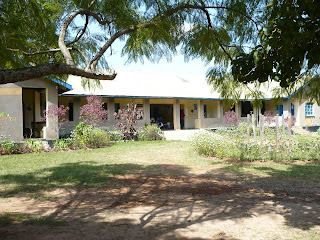

Above you can see both the hospital and the neighboring clinic where I spent the day out in the Teso area. I have to admit I find the outside of buildings much more beautiful here than the inside. Because the climate is so temperate, there are amazing displays of flowers and plant life around every building no matter how rudimentary. I think the Kenyan people take a certain amount of pride in their landscaping as well judging by how beautiful everything is.
The clinic itself was interesting. I was paired up with a "medical officer" who is an individual that has completed medical school in Kenya and done a one year general internship and is now out practicing general medicine. In this case, its a woman who is working for AMPATH (Academic Model for the Prevention and Treatment of HIV) who goes out and sees HIV positive patients and HIV at risk children. Its amazing because she is clearly the most senior and the most educated person out there and she goes out to this place probably once every couple of weeks. She struck me as very bright with a good foundation but hasn't had the resources or guidance to do a super thorough job. But she's honestly doing the best with she can with what she has to work with. She's actually interested in doing and internal medicine residency in the U.S. and I think it would be great if she could. What was cool about today is we started talking about some of her patients and I was actually able to offer some suggestions about evaluation and treatment that she seemed to appreciate. It reinforces how great it is to always have people to bounce ideas off of at home. The other neat part is you could tell that the people in this rural clinic ARE trying ... and are instituting this continuing medical education a couple times a month just trying to educate each other about basic medical issues. Today they were discussing asthma which is probably one of the few subjects that I feel like I could walk into a room and discuss basic diagnosis and treatment without too much preparation. We see a lot more of it in the United States than they do here but it can still be a problem. The background preparation that this medical officer had done to educate the people there was pretty much right on and I was able to add a few practical tips since we see so much of it in the U.S. The treatment they were able to do previously is very out of date as to the current thinking (1st line there was IV "adrenaline" or epinephrine) so we were able to brainstorm ways for them to be able to incorporate current treatment regimens in this rural place, including modifying a water bottle to make a "spacer" in order to better administer inhaled medicines to children and elderly adults when nebulizer machines aren't available due to lack of machines or lack of electricity. (Actual spacers dispensed in the U.S. cost ~ $50 a piece which is FAR beyond the cost reasonable for people here).
Just to give you an idea of cost of living, the average household makes about 35000 Kenyan shillings a year which is about the equivalent of $470. You can see why we Americans are rich here ... I can tell you I've withdrawn more than that already from my bank account to cover the cost of travel and other incidentals in the almost 4 weeks i've been here.
Just to give you an idea of cost of living, the average household makes about 35000 Kenyan shillings a year which is about the equivalent of $470. You can see why we Americans are rich here ... I can tell you I've withdrawn more than that already from my bank account to cover the cost of travel and other incidentals in the almost 4 weeks i've been here.



